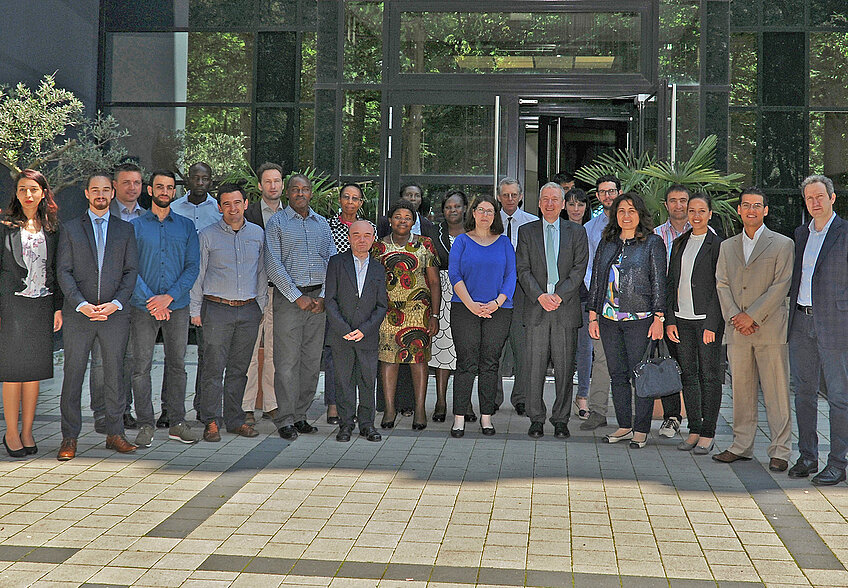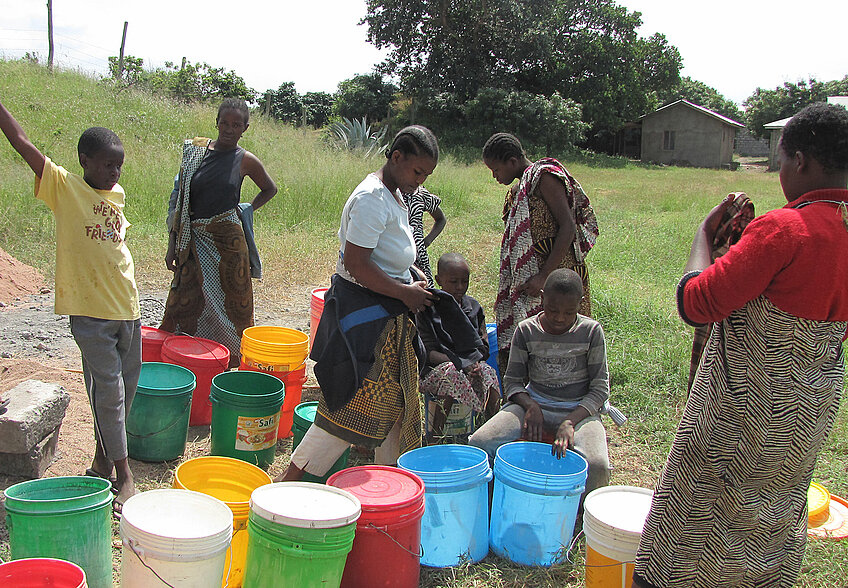
Representatives of ten African and European partner organizations at the kick-off event at HsKA (photo: Marion Broda)

Water supply for the population is often inadequate in the countries surrounding Lake Victoria (photo: Pia Britsch)
Under the leadership of Karlsruhe University of Applied Sciences, ten European and African partners will launch a water treatment project in the Lake Victoria region.
€3 million of funding through the EU's research and innovation program Horizon 2020
The kick-off meeting of the international research project “Integrated aquaculture based on sustainable water recirculating system for the Victoria Lake Basin (VicInAqua)“ took place in Karlsruhe on Tuesday, June 7th, 2016. A total of ten partners from Europe and Africa have joined forces to develop a sustainable, combined water purification system for fish farming in the Lake Victoria region. The project is headed by Prof. Dr. Jan Hoinkis, Managing Director of the Institute of Applied Research (Institut für Angewandte Forschung), Karlsruhe University of Applied Sciences (HsKA). In addition to HsKA, German project partners include the Steinbeis Europa-Zentrum and BPE International. European partners are the Institute on Membrane Technology (Italy), the University of Calabria and the companies AquaBioTech (Malta) and OXYGUARD International (Denmark). Moreover, African experts from Jomo Kenyatta University of Agriculture and Technology (Kenya), the Department of Agriculture, Fisheries and Livestock Development (Kenya) and the National Agricultural Research Organization (Uganda) participate in this project.
Their aim is to develop and test a sustainable, combined water treatment system for recirculating systems in fish farming and wastewater treatment of industrial and domestic sewage. The three-year project, which runs under the EU’s framework program "Horizon 2020", is funded with €3 million.
Lake Victoria is the largest lake in Africa and the second largest freshwater lake in the world. It is of great importance to the three riparian countries, i.e. Kenya, Uganda and Tanzania; the lake’s freshwater reservoir is essential to fisheries, industry and tourism. However, the Lake Victoria region is currently threatened by overfishing and eutrophication caused by industrial wastewater. The increasing number of settlements and the growing impoverishment of the population living on the lake are further issues that need to be addressed. Due to the oversupply of nutrients, large areas of the lake are covered by water hyacinths – an invasive species threatening the existence of native aquatic plants.
Therefore, the objective of the project is to develop a system for sustainable and environmentally friendly fish farming combined with effective wastewater treatment. Based on a membrane bioreactor, this multipurpose filtration system can be used as a recirculation system for fish tanks and wastewater treatment. Here it is essential to develop an efficient and robust purification system while ensuring sustainable decentralized energy supply – this is the only way to use the system in accordance with the local socio-economic conditions.
When using current membrane bioreactors, fouling might occur on the membranes. This effect is regarded as the main limitation of water flux which reduces the filtering performance of the membranes. As a result, cleaning chemicals must be used to clean the membranes at short intervals. That is why the project partners aim at developing a novel nanostructured membrane material for membrane reactors. This material cleans itself through the application of nanocatalysts. This aspect is of major importance to African developing countries, because here the use of chemicals may be an issue in terms of logistics and safety, for example.
The international team of researchers can build on the research findings of the previous "BioNexGen“ project which was funded by the EU under its FP7 program. Led by Prof. Dr. Jan Hoinkis, Director of the Institute of Applied Research at the Karlsruhe University of Applied Sciences, the project consortium succeeded in developing the next generation of bioreactor technology for filtration and thus biological purification of wastewater using fine-pored membranes. The systems stand out for their compact design and generate water of relatively high quality so that they can be used in a variety of applications.
The new “VicInAqua” project will focus on the aspect of using the treated water for the recirculation in fish tanks and for agricultural irrigation. After successful completion of the R&D phases, the concept will be tested in a pilot plant on the shores of Lake Victoria.
In addition to the innovative filtration system, VicInAcqua will also drive forward the development of a novel, sensor-controlled energy supply system for energy-autonomous operation. In order to increase the energy output, it is planned to create a hybrid system on the basis of photovoltaics, biogas-based process heat and thermoelectric generators. A thermoelectric generator allows electric energy to be generated from ambient heat. Due to the high temperatures in tropical countries, it is thus possible to increase the efficiency of photovoltaic elements. Even at a higher temperature level, a thermoelectric generator makes sure that the heat produced through combustion of biogas can be used to generate electric energy. This gas may be produced through fermentation of waste biomass, such as the water hyacinth invading Lake Victoria.
One of the key challenges will be to develop robust procedures, which can be optimally adapted to the socio-economic conditions in developing countries. As part of this project, it is therefore planned to train local experts and provide student exchange programs between European and African partner countries.
Back2024 © HAWtech ContactPrivacy PolicyLegal NoteLogin